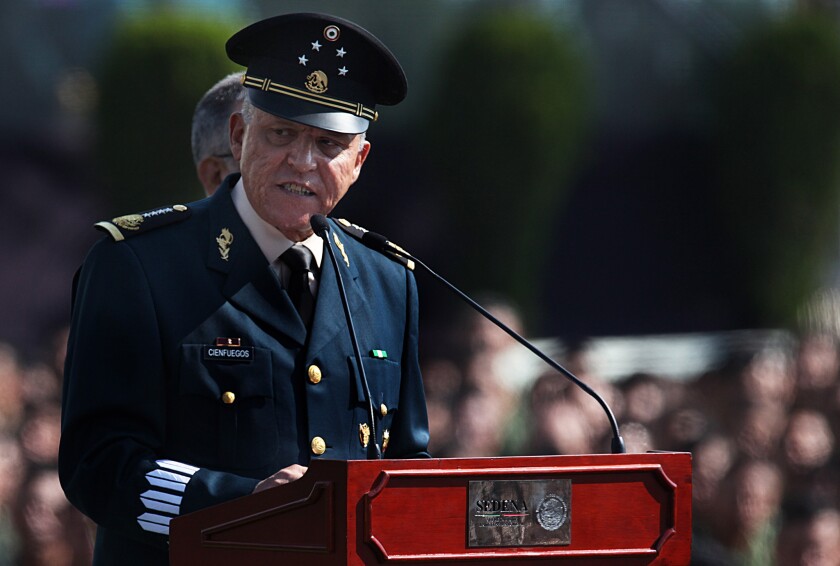Mexican President Andrés Manuel López Obrador on Friday accused the U.S. Drug Enforcement Administration of fabricating a case against a former Mexican defense minister who was arrested on drug trafficking charges at Los Angeles International Airport last year.
López Obrador, who in November successfully pressured the U.S. government to drop all charges against retired Gen. Salvador Cienfuegos and return him to Mexico, said Mexican prosecutors have decided not to charge the ex-defense chief because evidence shared by the U.S. was insufficient and did not implicate him in any crime.
“Why did they do the investigation like this?” López Obrador said. “Without support, without proof?”
He repeatedly criticized the DEA as ineffective and unprofessional and suggested that the arrest of Cienfuegos, 72, was politically motivated because it occurred shortly before the U.S. presidential election.
“Why was it on the eve of the election?” he said. “What was the intention?”
López Obrador’s comments at his daily news conference come one day after Mexico’s attorney general’s office said it had found no evidence to sustain U.S. allegations against Cienfuegos, who served as defense minister from 2012 to 2018 in the administration of ex-President Enrique Peña Nieto.
Cienfuegos had been accused by U.S. prosecutors of conspiring with the H-2 cartel in Mexico to smuggle tons of cocaine, heroin, methamphetamine and marijuana to the United States.
The seven-year investigation into Cienfuegos was based in part on thousands of intercepted cellphone messages that showed that he had accepted bribes to protect the H-2 cartel and crack down on the group’s rivals, prosecutors said.
Mexico’s decision to exonerate Cienfuegos has sparked anger here, with critics accusing López Obrador of reneging on his signature campaign vow to end impunity for corrupt officials.
It has also raised more doubts about the future of U.S.-Mexican cooperation on drug cases. Late last year, Mexico’s Congress passed a law restricting the investigative capacities of U.S. drug agents in Mexico and stripping them of their diplomatic immunity.
Former Mexican Defense Secretary Gen. Salvador Cienfuegos Zepeda in 2016.
(Marco Ugarte / Associated Press)
Cienfuegos had just landed at LAX with his family on Oct. 15 when U.S. law enforcement agents took him into custody. Mexico’s top military leaders were incensed that the Americans had not given them warning ahead of time.
They complained to López Obrador, who has become increasingly reliant on the armed forces in recent years as he alienates many of the nation’s traditional power players and puts soldiers and marines in charge of a vast array of civilian matters, including massive infrastructure projects and the nation’s response to COVID-19.
López Obrador complained to the U.S., threatening to withhold security cooperation with the United States unless charges were dropped. And the U.S. caved to his demands.
A joint U.S.-Mexico statement said Cienfuegos was being released from U.S. custody “so that he may be investigated and, if appropriate, charged, under Mexican law.”
“The United States determined that the broader interest in maintaining that relationship in a cooperative way outweighed the department’s interest and the public’s interest in pursuing this particular case,” U.S. Atty. Seth DuCharme told a judge at the time.
Yet Cienfuegos was never placed under arrest after he was returned by U.S. officials to Mexico.
And shortly after he returned home, Mexico’s Congress punished the U.S. anyway by passing a law that will require Mexican officials to get permission from a high-level security panel before meeting with “foreign agents” such as those from the DEA, and to send the Foreign and Public Security ministries information on what was discussed.
In the Cienfuegos case, López Obrador said he would release the evidence gathered by U.S. prosecutors to the public.
He acknowledged that doing so may anger the United States.
“They may say, ‘How dare we make this document known?’” he said. But, he added, “the evidence that was supposedly collected over many years is not solid.”
Some in Mexico have applauded López Obrador for standing up for Mexican sovereignty. Others say the quick exoneration of Cienfuegos has exposed the president as a hypocrite.
López Obrador, a center-left populist, won a landslide election in 2018 inveighing against the “mafia of power,” his scathing depiction of an elite class that controls the country’s wealth and politics and stands above the law.
“Adiós to the discourse against corruption,” tweeted Julio Hernández, a columnist with La Jornada newspaper, following the government’s announcement that Cienfuegos was cleared of any charges.
Others complained that the Cienfuegos decision further consecrated the military’s power in Mexico.
“The exoneration of Salvador Cienfuegos demonstrates that the armed forces are untouchable … [and] will continue to be outside of democratic scrutiny,” tweeted Denise Dresser, a columnist for Reforma newspaper. “They are the ones who govern, in reality, and have been converted into the new mafia of power.”
Get breaking news, investigations, analysis and more signature journalism from the Los Angeles Times in your inbox.
You may occasionally receive promotional content from the Los Angeles Times.
This article is auto-generated by Algorithm Source: www.latimes.com



